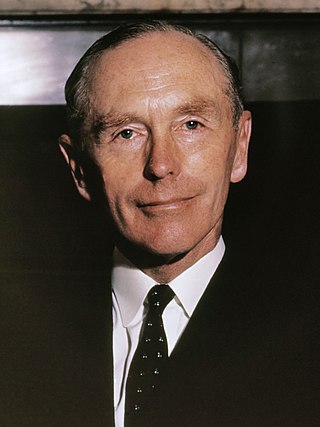Related Research Articles
In the United Kingdom and the British Overseas Territories, personal bravery, achievement, or service are rewarded with honours. The honours system consists of three types of award:
Peerages in the United Kingdom form a legal system comprising both hereditary and lifetime titles, composed of various ranks, and within the framework of the Constitution of the United Kingdom form a constituent part of the legislative process and the British honours system. The British monarch is considered the fount of honour and is notionally the only person who can grant peerages, though there are many conventions about how this power is used, especially at the request of the British government. The term peerage can be used both collectively to refer to the entire body of titled nobility, and individually to refer to a specific title. British peerage title holders are termed peers of the Realm.

Douglas Richard Hurd, Baron Hurd of Westwell, is a British Conservative Party politician who served in the governments of Margaret Thatcher and John Major from 1979 to 1995.

Patrick George Thomas Buchan-Hepburn, 1st Baron Hailes, was a British Conservative politician and the only Governor-General of the short-lived West Indies Federation from 1958 to 1962.

John James Lawson, 1st Baron Lawson, PC was a British trade unionist and a Labour Party politician. A miner and later Member of Parliament in County Durham, he served in the governments of Ramsay MacDonald and Clement Attlee. In 1950 he was ennobled as Baron Lawson, of Beamish in the County of Durham, and is sometimes referred to as Lord Lawson of Beamish.

Douglas Hewitt Hacking, 1st Baron Hacking was a British Conservative politician.

The 1997 Prime Minister's Resignation Honours were officially announced in two supplements to The London Gazette of 1 August 1997 and marked the May 1997 resignation of the Prime Minister, John Major.

The 1964 Prime Minister's Resignation Honours were officially announced in the London Gazette of 27 November 1964 and marked the October 1964 electoral defeat of the Prime Minister, Sir Alec Douglas-Home.
The 1966 Dissolution Honours List was issued on 19 May 1966 following the dissolution of the United Kingdom parliament in preparation for a general election.

In the kingdom of England, a feudal barony or barony by tenure was the highest degree of feudal land tenure, namely per baroniam, under which the land-holder owed the service of being one of the king's barons. The duties owed by and the privileges granted to feudal barons are not exactly defined, but they involved the duty of providing soldiers to the royal feudal army on demand by the king, and the privilege of attendance at the king's feudal court, the Magnum Concilium, the precursor of parliament.
The 1921 Birthday Honours were appointments by King George V to various orders and honours to reward and highlight good works by citizens of the British Empire. The appointments were made to celebrate the official birthday of the King, and were published on 3 and 4 June 1921.
The New Year Honours 1904, announced at the time as the Indian Honours, were appointments to various orders and honours of British India. The list was published in The Times on 1 January 1904, and the various honours were gazetted in The London Gazette on the same day.
The February 1974 Dissolution Honours List was issued on 2 April 1974 following the dissolution of the United Kingdom parliament in preparation for a general election.
The 1970 Dissolution Honours List was issued on 2 June 1970 to mark the dissolution of the United Kingdom parliament prior to the 1970 general election.
The 1959 Dissolution Honours List was issued on 19 September 1959 to mark the dissolution of the United Kingdom parliament prior to the 1959 general election.
The 1964 Dissolution Honours were officially announced on 27 November 1964 and marked the dissolution of parliament following the 1964 General Election.
The 1945 Dissolution Honours List was issued on 7 June to mark the dissolution of the United Kingdom parliament prior to the 1945 general election.
The 1885 Dissolution Honours List was issued in June 1885 prior to the general election of that year.
The 1892 Dissolution Honours List was issued in August 1892 following the general election of that year.
The 1924 Prime Minister's Resignation Honours were awards announced on 8 February 1924 to mark the exit of Prime Minister Stanley Baldwin, who resigned his first term as prime minister in late January.